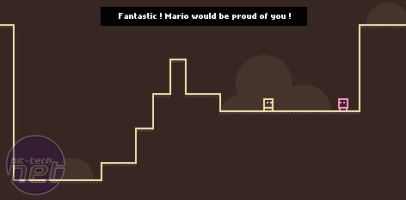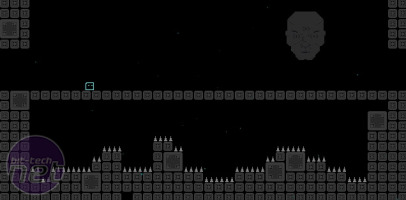
I’m a firm believer that it’s better to do something simple very well than it is to fumble something more complicated. So, it’s no surprise that I like indie platformer Orton and the Princess – it’s uncomplicated and polished to perfection. You are the beige square. The eponymous Princess is the pink square. You have to get to the pink square. Then the next level begins.
Gameplay-wise, Orton and the Princess isn’t any different to dozens of other platform games. Avoid the spikes, dodge the traps, reach the end of the level, set a high score. It does a few things though which help to set it apart – little things, like having an incredibly energetic banjo theme tune. Ding-ding-ding,duh-dong-ding!
[break]
The best thing about Orton and the Princess is the narrator, who weaves a subtle humour and irony into the story. He lies to you, telling you that you can walk across the spikes without harm. He teases you, telling you to jump like an Italian plumber. He derides you, telling you that everyone else completed the level you’re on in one go.
The narrator isn’t something wholly original or startlingly brilliant, but it does provide just enough of a twist to keep you playing. It helps that the game itself is so fluid and fast too.
Orton and the Princess isn’t the only game to use an anarchic, unreliable narrator though – and one of my favourite ones which also uses this style is Seven Minutes, whose guiding voice isn’t just unruly, but incredibly evil. Seven Minutes is, in many ways, the opposite of Orton on the Princess. Where Orton is easy and fun, Seven is difficult and punishing. Where one is light, the other is dark. You should try them both out and let me know your thoughts in the forums.
Gameplay-wise, Orton and the Princess isn’t any different to dozens of other platform games. Avoid the spikes, dodge the traps, reach the end of the level, set a high score. It does a few things though which help to set it apart – little things, like having an incredibly energetic banjo theme tune. Ding-ding-ding,duh-dong-ding!
[break]
The best thing about Orton and the Princess is the narrator, who weaves a subtle humour and irony into the story. He lies to you, telling you that you can walk across the spikes without harm. He teases you, telling you to jump like an Italian plumber. He derides you, telling you that everyone else completed the level you’re on in one go.
The narrator isn’t something wholly original or startlingly brilliant, but it does provide just enough of a twist to keep you playing. It helps that the game itself is so fluid and fast too.
Orton and the Princess isn’t the only game to use an anarchic, unreliable narrator though – and one of my favourite ones which also uses this style is Seven Minutes, whose guiding voice isn’t just unruly, but incredibly evil. Seven Minutes is, in many ways, the opposite of Orton on the Princess. Where Orton is easy and fun, Seven is difficult and punishing. Where one is light, the other is dark. You should try them both out and let me know your thoughts in the forums.

MSI MPG Velox 100R Chassis Review
October 14 2021 | 15:04








Want to comment? Please log in.